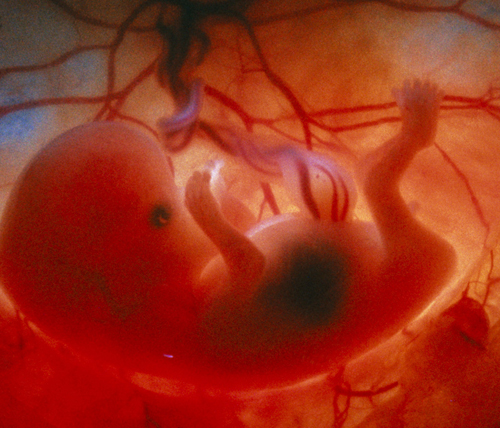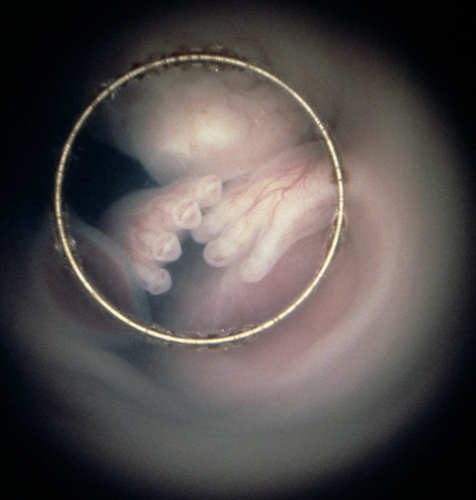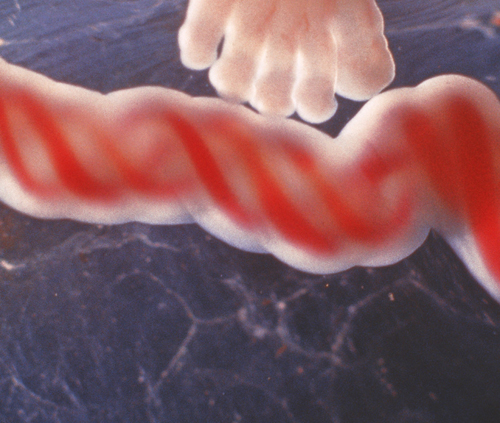You are 10 Weeks and 4 Days 206 days to go…
Your baby’s limbs are more developed now, enabling him to move, and his hands and fingers can be clearly seen on a scan.
Your baby today
The umbilical cord gradually becomes more coiled as the
pregnancy progresses—as seen here on the left of the image. This coiling
is thought to occur because of the many movements the embryo makes.

Your baby takes on a more human form
as his neck lengthens and his head is seen as separate from his body.
The head is still about half the total length of your baby. The length
of your baby can be measured on an ultrasound by measuring the distance
between your baby’s head (crown) and his bottom (rump). This is noted as
the CRL (crown-rump length) measurement. The head is also measured:
this is the biparietal diameter (BPD), which is the distance between the
two parietal bones on each side of the baby’s head.
Now that the neck is more
developed and all the limb joints have formed, your baby can begin to
make several movements. The completed diaphragm allows for breathing
movements. In the gut, your baby’s duodenum now opens up along its
length, the small bowel starts to rotate and prepares to re-enter the
abdominal cavity.
Within your baby’s
mouth, the hard palate has formed; the relatively large tongue makes it
easier for your baby to move amniotic fluid through the nostrils rather
than through his mouth with each breath.
This endoscopic image, obtained by passing a fine light-emitting tube into the uterus, shows the hands obscuring the fetus’s face.

Nuchal fold screening
At around 11 weeks
of pregnancy, you may be offered a nuchal translucency screening. This
test assesses the risk of Down syndrome by measuring the width of the
fold of skin behind your baby’s neck to see if any excess fluid has
collected there.
The nuchal fold scan is considered to be 80 percent accurate. If your doctor offers you a blood test (PAPP-A—see The “combined” test) with the scan, it becomes 85–90 percent accurate. When the nasal bone is measured, the accuracy rises to 95 percent.
If the results show a high risk, another test is offered.
… Twins
Double the trouble
Since your body is growing two or more babies,
there will be physical effects. But there is a positive side: Since
your growing size and hormones are the cause, these symptoms are often
worse if the babies are doing well.
Mention severe
symptoms if you’re suffering, but remember these symptoms are not
serious. You may be seen earlier if you suspect you’re having twins, and
will go on to have more prenatal appointments and ultrasound scans. You
may be asked to limit activities like travel and exercise as your
pregnancy progresses.
In the first three months, your heart has to work harder to pump more fluid around your body, which can lead to a greater feeling of fatigue.
Morning sickness can be more severe because you have higher amounts of pregnancy hormones.
You are 10 Weeks and 5 Days 205 days to go…
Healthy teeth and gums are essential in pregnancy, so brush thoroughly and make regular dental appointments.
Make sure you’re taking care of your teeth and gums.
The hormone progesterone causes gum tissue to soften and it’s therefore
more likely to bleed when brushed and to become infected.
Unfortunately, there is a link between gum disease and premature birth.
The bacteria caused by periodontal disease release toxins into the
mother’s bloodstream, which reach the placenta and can affect the baby’s
growth. The infection can also lead to the production of inflammatory
chemicals that can cause the cervix to dilate and trigger contractions.
To keep your mouth
healthy during your pregnancy, brush your teeth twice a day with a
fluoride toothpaste and floss your teeth every day. Be sure to see your
dentist regularly for cleanings as recommended. If you need antibiotics
to treat an infection, make sure to remind your dentist you are pregnant
so that medications that are safe in pregnancy are prescribed.
If your dentist needs to take X-rays of your mouth, he or she will protect your baby by covering your abdomen with a lead apron.
Make sure that you brush your teeth
regularly, or even more often than usual, and ensure that you floss
well. This will reduce the risk of your gums being infected.

… Doctor
| Q: |
Why am I getting more vaginal discharge since being pregnant?
|
| A: |
In pregnancy, the layer of muscle in the vagina thickens, and
cells lining the vagina multiply in response to an increase in the
pregnancy hormone estrogen. These changes prepare the vagina for
childbirth. As a side effect, the extra cells mean that there is an
increase in vaginal discharge, known as leucorrhea.
If you feel sore or
itchy in the vaginal area and the discharge is anything other than cream
or white, or smells, your doctor will need to take a swab to rule out
infection.
Some infections,
such as yeast, cause an abnormal discharge. They are common in pregnancy
and are easily treated. Even if you’ve self-treated yeast infections
before, call your doctor for advice this time. She’ll likely recommend
medication that’s applied vaginally, but if she determines that you have
bacterial vaginosis, oral medication may be required.
|
A US study found that,
on average, those with one child were missing two or three teeth, and
those with four or more children were missing between four and eight
teeth.
So the old wives’ tale
that “You will lose a tooth for every child” could have some basis in
truth. It might be because of the hormonal changes that occur during
pregnancy that can cause gum disease (see image).
You are 10 Weeks and 6 Days 204 days to go…
Has sex been the last thing on your mind, or have you noticed an increase in your libido? It seems all women are different.
Your baby today
This is the umbilical cord of an 11-week-old fetus. The cord is a
strand of tissue that contains the two spiraling arteries that carry
blood to the placenta and a vein that returns blood to the developing
baby.

Being expectant parents can bring you emotionally closer
as a couple, but not necessarily physically. While some women find that
their libido increases during pregnancy, often much to their partner’s
surprise, the majority find that their sex drive diminishes in the early
weeks.
In the first trimester
many women are affected by fatigue and nausea, and so the last thing
they want to do is have sex. If this is the case then make sure you
explain how you feel to your partner, so that he doesn’t feel rejected.
Try to find other ways to stay physically connected with each other:
perhaps you can still enjoy some aspects of foreplay, if not penetrative
sex. If not, at least try to be affectionate to each other.
It may be your partner
who’s anxious about having sex. Many men worry about harming the baby
through penetrative sex, although there is no chance of this happening.
Remember, if you do want to have sex, then unless a doctor tells you otherwise, it’s safe to do so while you are pregnant.
… Nutritionist
| Q: |
Is it safe to drink herbal teas?
|
| A: |
Herbal teas do not contain caffeine, but herbs and other
dietary supplements are not regulated by the Food and Drug
Administration, and there’s not much research about the effects of many
herbs on pregnancy. Stick to decaffeinated black teas. If you want to
drink fruit or ginger teas, read the ingredient label carefully to make
sure that no herbs are present. Also, limit green tea intake, because it
may interfere with fetal growth.
|

… Your body
Tackling spider veins
Spider veins (or spider nevi) are tiny, red blood vessels
that branch outward, just under the skin. They are caused by an
increase in the level of estrogen during pregnancy. They usually appear
on the face, upper chest, neck, arms, and legs. Often disappearing soon
after birth, spider veins are not a cause for concern and can usually be
covered with makeup. You can discourage spider veins by:
Upping your intake of vitamin C, which helps to strengthen your veins and capillaries.
Avoiding crossing your legs, which can exacerbate the problem.
Getting regular exercise because it keeps your blood circulating around your body.
Avoiding standing or sitting for long periods, and elevating your feet when you do sit down.
Avoid eating spicy food since some women have found that this helps reduce spider veins.
If you suddenly notice lots of broken veins appearing on your skin, see your doctor.